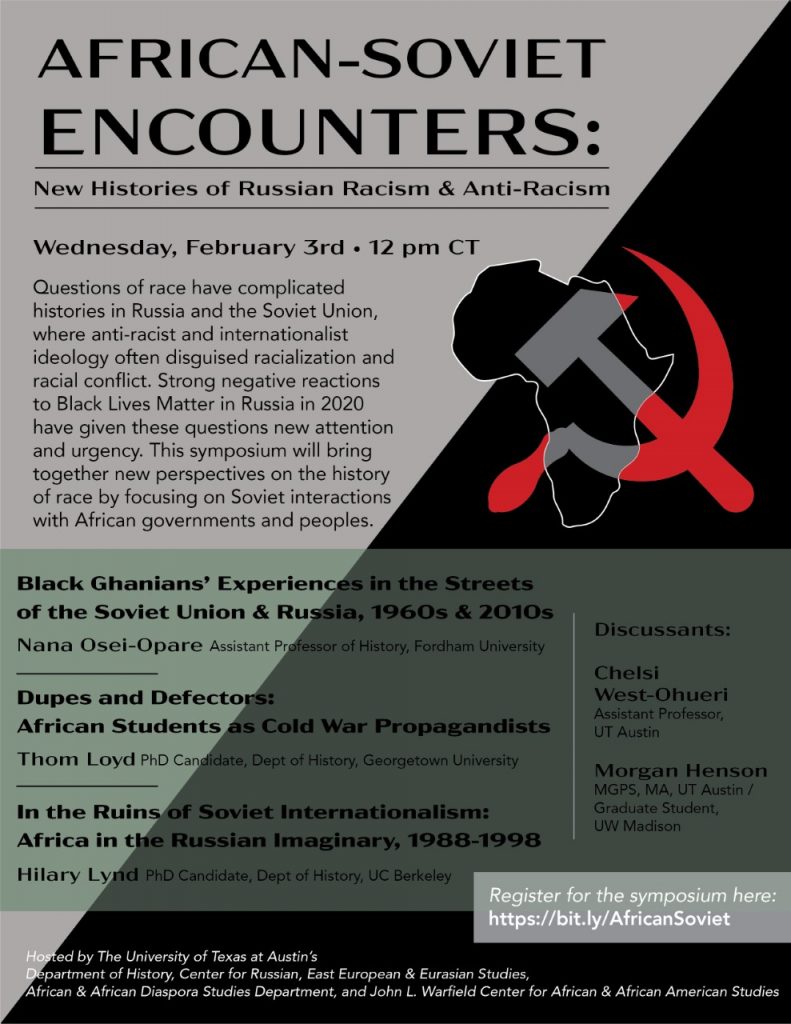
Questions of race have complicated histories in Russia and the Soviet Union, where a commitment to anti-racist and internationalist ideology often disguised racialization and racial conflict. The strong negative reactions to Black Lives Matter in Russia in 2020 have given these questions new attention and urgency. One factor in this history that is routinely overlooked is the role played by representations and representatives of Africa and Africans in politics and culture. This symposium will bring together new voices and perspectives on the history of race and racialization in the Soviet Union by focusing on Soviet interactions with African governments and people, and the presence of Africans in the Soviet Union.

Register: https://bit.ly/AfricanSoviet
February 3, 2021. 12noonCT.
Speakers:
Nana Osei-Opare, Asst Professor, Department of History, Fordham University
“Black Ghanaians’ Experiences in the Streets of the Soviet Union and Russia, 1960s and 2010s.”
Black Ghanaians in the Soviet Union often found themselves mediating between the Soviet ideological commitment to anti-racism and the racism they encountered every day. How did Ghanaians who lived in Russia in two distinct periods build a Ghanaian national identity and racial solidarity in the conditions of legal, immigration, and economic marginality?
Thom Loyd, PhD candidate, Department of History, Georgetown University
“Dupes and Defectors: African Students as Cold War Propagandists”
In the 1960s, a flurry of travel accounts by Black African students in the Soviet Union appeared in both capitalist and communist publications. Their chronicles of racial discrimination, segregation, and poor conditions were often taken at face value but recently declassified documents require us to rethink the ways these documents have been used to understand the Black African students’ experiences.
Hilary Lynd, PhD candidate, Department of History, UC Berkeley
The collapse of the Soviet Union exacerbated anxieties about where Russia fit into global hierarchies. No longer a superpower, no longer animated by the upward Marxist sweep of progress, Russia in the 1990s found itself in a newly insecure position. Africans suffered the consequences of these new global anxieties. How did Russians invoke images of Black Africa in making sense of Russia’s new condition during and after the Soviet collapse?
Discussants:
Chelsi West Ohueri, Asst Professor, DSES/CREEES, UT Austin
Morgan Henson, MGPS/MA UT Austin, Graduate Student, Department of Sociology, UW Madison
Organizers
Rebecca Johnston, PhD candidate, Department of History, UT Austin
Joan Neuberger, Professor of History, UT Austin
Sponsored by: UT Austin’s Department of History, Center for Russian, East European, and Eurasian Studies, African and African Diaspora Studies Department, and John L. Warfield Center for African and African American Studies
The views and opinions expressed in this article or video are those of the individual author(s) or presenter(s) and do not necessarily reflect the policy or views of the editors at Not Even Past, the UT Department of History, the University of Texas at Austin, or the UT System Board of Regents. Not Even Past is an online public history magazine rather than a peer-reviewed academic journal. While we make efforts to ensure that factual information in articles was obtained from reliable sources, Not Even Past is not responsible for any errors or omissions.



